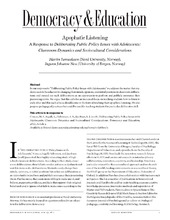| dc.contributor.author | Samuelsson, Martin Per | |
| dc.contributor.author | Ness, Ingunn Johanne | |
| dc.date.accessioned | 2020-06-11T12:42:20Z | |
| dc.date.available | 2020-06-11T12:42:20Z | |
| dc.date.issued | 2019 | |
| dc.Published | Samuelsson MP, Ness IJ. Apophatic Listening. A Response to Deliberating Public Policy Issues with Adolescents: Classroom Dynamics and Sociocultural Considerations. Democracy and Education. 2019;27(1):6 | eng |
| dc.identifier.issn | 2164-7992 | |
| dc.identifier.issn | 1085-3545 | |
| dc.identifier.uri | https://hdl.handle.net/1956/22541 | |
| dc.description.abstract | In our response to “Deliberating Public Policy Issues with Adolescents,” we address the matter that students seem to be reluctant to changing their minds, opinions, and initial positions in classroom deliberations and instead see such deliberations as an opportunity to perform and publicly announce their preexisting views. We argue that this calls for an increased focus on teaching students how to listen to each other and that such a focus should come in the form of teaching them apophatic listening. We also propose pedagogical practices that could be used for teaching students this particular deliberative skill. | en_US |
| dc.language.iso | eng | eng |
| dc.publisher | Graduate School of Education and Counseling, Lewis & Clark | eng |
| dc.title | Apophatic Listening. A Response to Deliberating Public Policy Issues with Adolescents: Classroom Dynamics and Sociocultural Considerations | eng |
| dc.type | Peer reviewed | |
| dc.type | Journal article | |
| dc.date.updated | 2020-01-19T11:09:24Z | |
| dc.description.version | publishedVersion | |
| dc.rights.holder | Copyright 2019 Democracy and Education | eng |
| dc.identifier.cristin | 1698210 | |
| dc.source.journal | Democracy and Education | |
